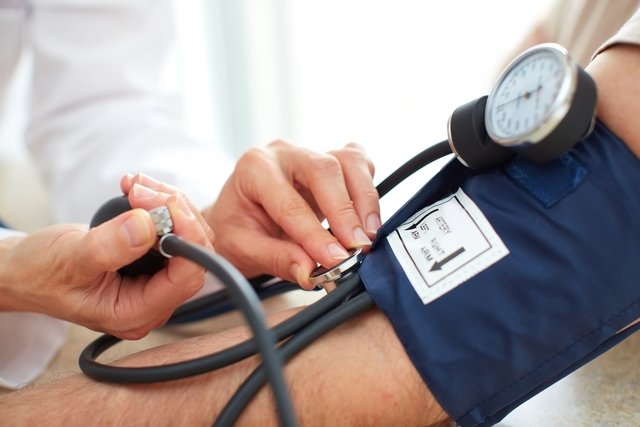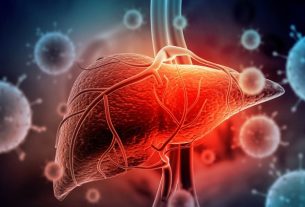Low blood pressure, in some people, is normal and does not pose a health risk. However, when your blood pressure drops suddenly or is accompanied by symptoms such as dizziness, fainting or tiredness, it may indicate a more serious problem, such as dehydration, infection or heart problems.
Blood pressure is considered low when it is below 90×60 mmHg, and there is no minimum pressure limit, as long as the person has always had low blood pressure.
If low blood pressure is accompanied by symptoms, it is important to consult a cardiologist so that an assessment can be carried out to identify the cause of low blood pressure and, thus, be able to initiate the most appropriate treatment.

Main causes
The main causes of low blood pressure are:
1. Dehydration
Dehydration happens when the body is losing more water than was ingested and, therefore, the blood vessels have less blood inside them, which ends up lowering blood pressure and causing the appearance of symptoms such as weakness, a feeling of fainting and tiredness.
Dehydration is more common in the elderly or children, especially during the summer, or in people who use diuretics without medical advice.
What to do: rehydration must be done with homemade serum to ingest the water that is missing in the body along with minerals, however, if the dehydration is severe, you must go to the hospital, as it may be necessary to receive serum directly into the vein. See what to do in case of dehydration.
2. Vitamin B12 and folic acid deficiency
Vitamin B12 and folic acid are two very important vitamins for the formation of red blood cells and, therefore, when they are lacking in the body they can cause anemia. Since there are fewer cells in the blood, it is normal for blood pressure to drop.
Some signs that may indicate anemia include weakness, paleness, tingling in the feet or hands, stiffness in the arms and legs or loss of sensitivity to touch, for example.
What to do: when anemia is suspected, it is very important to consult a general practitioner to identify the correct cause of the anemia and initiate the correct treatment. In the case of vitamin B12 or folic acid deficiency, you should supplement with these vitamins and increase your intake of foods such as salmon or liver steak.
3. Use of some medicines
There are several types of medicines that, when used for a long time, can cause a marked decrease in blood pressure.
Some of the most common examples include high blood pressure medications, diuretics, medications for heart problems, antidepressants, and medications for erectile dysfunction.
What to do: if you are taking one of these medications, it is advisable to consult the doctor who wrote the prescription to assess the possibility of changing the medication or changing the dose.
4. Hormonal changes
When there is a change in the production of hormones by the thyroid or adrenal gland, for example, there may be dilation of blood vessels, which ends up causing a sharp drop in blood pressure.
What to do: It is important to consult an endocrinologist so that tests can be carried out to help identify hormonal changes and, thus, be able to start the most appropriate treatment.
5. Internal bleeding
In internal bleeding, bleeding into the body occurs and, therefore, it can be more difficult to identify. When this happens, it is possible to lose a lot of blood, which ends up leaving the blood vessels with less blood, which ends up reducing blood pressure significantly.
Low blood pressure can also happen when there is very intense external bleeding. Some signs that you may have internal bleeding include weakness, dizziness, difficulty breathing, or a constant headache. See when internal bleeding can happen and how to identify it.
What to do: if internal bleeding is suspected, go to the hospital immediately to identify the site of the bleeding and begin the most appropriate treatment.
6. Heart problems
Changes in the functioning of the heart can also cause a decrease in blood pressure by reducing the amount of blood circulating in the body. The most common problems include heart failure, heart valve changes and arrhythmias.
In these situations, in addition to the drop in blood pressure, other signs such as chest discomfort, excessive tiredness, a feeling of shortness of breath and cold sweats, for example, may also appear. Check out 12 symptoms that may indicate heart problems.
What to do: if there is a history of heart problems in the family or if changes in the heart are suspected, you should consult a cardiologist to identify the correct diagnosis and begin the most appropriate treatment.
7. Serious infection
Although it is rarer, low blood pressure can also occur due to a serious infection in the body, known as sepsis or septic shock. This happens because bacteria spread throughout the body and release toxins that affect blood vessels, leading to a sharp decrease in blood pressure. See what symptoms may indicate sepsis.
What to do: if you have an infection somewhere in your body and experience a sudden drop in blood pressure with symptoms such as weakness, dizziness and a feeling of fainting, it is important to go to the hospital quickly to start administering antibiotics directly into your vein.
8. Pregnancy
It is common for pregnant women to experience a decrease in blood pressure during this period, especially during the first 24 weeks, returning to normal after childbirth. This situation occurs due to the fact that the blood vessels expand due to the increase in blood flow that is necessary to bring nutrients and oxygen to the fetus.
What to do: In general, it is not necessary to carry out specific treatment, it is important to drink enough water during the day, wear light and comfortable clothing, and have at least 3 main meals and 2 to 3 junk meals. In addition, you should avoid standing for a long time, taking very hot baths and getting up too quickly when lying down or tired.
However, depending on the cause of low blood pressure or whether hypotension leads to any complications, the obstetrician may recommend starting pharmacological treatment, with vitamin or mineral supplements, for example.
Online blood pressure calculator
To find out if your blood pressure is low, please enter the data into our calculator:
When to go to the doctor
It is advisable to consult your general practitioner when blood pressure drops more than 40 mmHg or is accompanied by:
- Dizziness and nausea;
- Fainting;
- Excessive thirst;
- Difficulty concentrating;
- Blurry vision;
- Excessive tiredness;
- Cold, pale skin.
When symptoms of low blood pressure appear, it is recommended to lay the person down and raise their legs, allowing the blood to reach the brain. If symptoms persist for more than 10 minutes, you should call medical help by calling 192, or take the person to an emergency room.

Sign up for our newsletter and stay up to date with exclusive news
that can transform your routine!
Warning: Undefined array key "title" in /home/storelat/public_html/wp-content/plugins/link-whisper-premium/templates/frontend/related-posts.php on line 12
Warning: Undefined array key "title_tag" in /home/storelat/public_html/wp-content/plugins/link-whisper-premium/templates/frontend/related-posts.php on line 13



